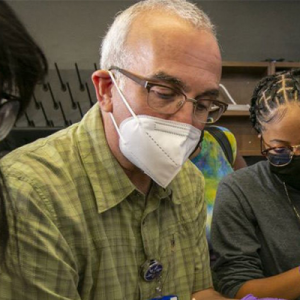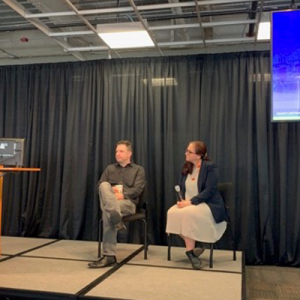Trudy Oliver Tracks a Deadly, Shapeshifting Tumor
Trudy Oliver, PhD, studies a type of cancer that has a 5-year overall survival rate of just 7%. Its biological drivers are different from most other cancers, so it’s harder to develop targeted treatments. On top of that, research into this tumor is under-funded.
Can Scientists Learn to Prevent Brain Tumors?
David Ashley, PhD, FRACP, MBBS, the Rory David Deutsch Distinguished Professor of Neuro-Oncology and director of the Preston Robert Tisch Brain Tumor Center at Duke, calls his choice to focus his c
Dean Klotman's Friday Message & Conversation with Barbara Hooper, PhD
Dean Mary Klotman, MD, welcomes Barbara Hooper, the Founding Program Director and Division Chief of the Occupational Therapy Doctorate Program at Duke. They discuss the division's goals and some of the misconceptions about Occupational Therapy, and about what sets Duke’s program apart.
Med Student Advocates for Home Health Visits to Meet Patients Where They’re At
Home visiting programs have been shown to reduce emergency room visits, hospitalizations, and overall health care costs for patients with complex needs.
Inaugural Dean’s Staff Awards
The Dean’s Staff Awards will be awarded annually to recognize exemplary staff supporting the School of Medicine’s mission and values.
Study Examines Reluctance of Black Patients to Get Defibrillators
Black patients at risk for sudden cardiac arrest have historically been less likely to receive potentially life-saving implantable cardioverter defibrillators (ICD) than white patients.
A Decade of Global Reach, From Len White's Backyard
Len White's pioneering Coursera online course in neuroscience has changed lives around the world.
Chasing New Targets in Parkinson’s Disease
Colin Duckett, Vice Dean for Basic Science, led a discussion with premier researchers taking a a closer look at the fundamental biology of Parkinson’s disease during the March 30 Dean’s Distinguished Research Series.
Rethinking the Use of Race and Other Labels in Genetics Research
A national committee co-chaired by Duke Professor Charmaine Royal issued a report that emphasized the high stakes of ensuring that genetics research benefits all groups in society and mitigates harm.
Collaboration Seeks Genetic Clues to Chronic Lung Disease
Idiopathic pulmonary fibrosis (IPF) is a disease that causes scarring on the lungs. Over time, as more scarring occurs, patients experience decreased lung function and difficulty breathing.









